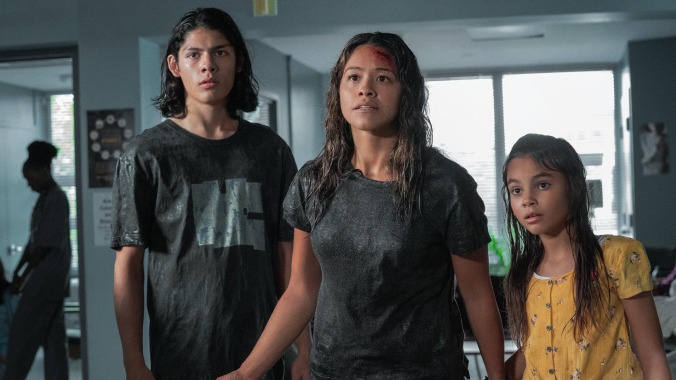Gina Rodriguez battles endless insomnia in the Netflix sci-fi snoozer Awake
Prepare for another round of Unexplained Global Happening, or UGH.

Movies, TV shows, and novels about humanity contending with a sudden mysterious disruptive phenomenon are becoming so commonplace that it might be useful to coin a generic term for such weirdness. Borrowing the title of one notorious example gives us Unexplained Global Happening, or UGH. While characters will speculate at length about an UGH’s origin or nature, no concrete answer generally arrives; the dramatic emphasis is on survival, trauma, or both. Such tales invariably sport a tantalizing what-if? hook that has you eager to know more. It’s the follow-through that’s often shaky.
Awake serves up a dual UGH—one instantaneous event that somehow produces two catastrophic outcomes. (A single line of dialogue attempts to hand-wave a connection; individual suspension of disbelief will vary.) While driving home one ordinary day, Jill (Gina Rodriguez), a former military officer who’s temporarily lost custody of her two children due to a drug conviction, suddenly loses control of her car, in common with seemingly every other driver on the road. Her immediate crisis involves escaping from the vehicle with her kids (who were with her on a visitation) as it sinks to the bottom of a lake, but she and the rest of the world soon discover that every device with a electronic circuit has become inoperable, ending the digital age in one fell swoop. There’s no time to consider the enormous impact that a total power failure would have on society, though, because this particular UGH fried human circuitry as well: Jill can’t sleep that night, and neither, it emerges the next day, could anybody else. Which is a bit of a problem, since mammals that don’t sleep will die within a matter of weeks.
It’s a nifty enough premise, credited to Gregory Poirier (who previously dreamed up the less ingenious story for National Treasure: Book Of Secrets). Awake’s screenplay, however, was written by director Mark Raso and his brother, Joseph, who are in such a hurry to generate tension that they don’t let the idea breathe. Almost everyone has experienced insomnia at some point, and while it would definitely be disconcerting to learn that nobody else slept last night, either—especially in conjunction with the power outage—at least two nights of collective staring at the ceiling would likely be required before civilization began to collapse. Instead, a religious cult instantly develops around Jill’s young daughter, Matilda (Ariana Greenblatt), one of only two known people for whom unconsciousness remains an option. The crazy church folks want to sacrifice her (why this would appease God is unclear, since they also treat her as a Chosen One); the military, understandably, wants to study her, in the hope of finding a cure. Jill, on the other hand, just wants to keep her children safe, and Awake becomes the saga of a mom’s redemption.
Rodriguez works hard to make this personal angle compelling, exhibiting mama-bear ferocity, but the film’s ultra-bleak premise doesn’t cooperate. After a while, Jill becomes convinced—not without reason—that most of humanity, including herself and her teenage son, Noah (Lucius Hoyos), is doomed, and becomes intent upon finding the other person who can still sleep, hoping that this random elderly woman will raise Matilda after everyone else is dead. In other words, Jill wants to entrust her child to somebody else—the very situation she was in when the movie started. Similarly, subtext about humanity’s need to start over afresh, which gets voiced aloud at one point by a dude (Shamier Anderson) who advocates torching all the libraries so that humanity can rid itself of terrible received notions, competes with an UGH so dire that even the film’s guardedly optimistic ending mostly just inspires the question “Okay, but now what?” (Put another way, and keeping things vague, Awake’s best-case scenario lands it roughly where the average post-apocalyptic movie begins.)
The Raso brothers do throw in a few witty touches, as when Jill, having found a car that’s old enough to still work (i.e., that’s devoid of electronics), has to drive around a group of nude people standing in the middle of the road, gazing at the horizon—apparently adherents to some other insta-cult about which we otherwise learn nothing. And the film has a memorably berserk third act, cashing in on the paranoia and hallucinations that people genuinely do experience after several consecutive days without sleep (though it’s a bit convenient that this escalates in everyone simultaneously, as if a timer had gone off). But the cast struggles to find much beneath the text’s overly rushed surface—Jennifer Jason Leigh, as a military psychiatrist who specializes in sleep disorders and just happens to be Jill’s former boss, looks bored out of her skull—and there’s ultimately nothing inherently compelling about watching people not sleep, which is what constitutes 99.9% of every movie ever made (excepting Andy Warhol’s Sleep). You’ve seen better UGHs.